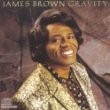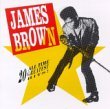James Brown
James Brown
He is known universally as ‘The Godfather Of Soul' but he is also the undisputed ‘King Of Funk,' an American original whose pioneering work has literally helped shape the course of contemporary music. His catalog of classic recordings have made him the most sampled recording artist in history and without any doubt, the rap and hip-hop movement finds its very genesis in his music. He is an American national treasure whose influence on 20th century black culture is inestimable.
A leader who played a key role in the civil rights movement of the ‘60s and gave voice to a people discovering self-pride, economic freedom and political empowerment in the ‘70s. He is also a globally-recognized entertainer who has justifiably earned the nickname ‘the hardest working man in show business' just a few years into a momentous recording career that has included no less than 119 charted singles and more than 50 best-selling albums. He has sold literally millions of records since "Please, Please, Please" first dominated the airwaves and the charts in 1956. He was justifiably inducted into the Rock & Roll Hall Of Fame in 1986 and was awarded a Lifetime Achievement by The Recording Academy in 1992. But beyond the hundreds of accolades and awards he's received over his six decades as a chartmaker, his is a household name from Lagos, Nigeria to London, England and from his early home of Augusta, Georgia to Accra, Ghana.
Beyond legendary status, Mr. James Brown is simply a worldwide icon.
A James Brown show could last anywhere from ninety minutes to three hours but even at that length it would be virtually impossible for this international superstar to include all of his classic hits. Emotion-filled ballads like "Try Me," "Lost Someone," "Prisoner Of Love" and the enduring "It's A Man's Man's Man's World"; super-groove hits like his first crossover smash "Papa's Got A Brand New Bag," "I Got You (I Feel Good)" and "Cold Sweat"; anthems of pride and empowerment like "Say It Loud, I'm Black And I'm Proud" (which marked a musical turning point in the civil rights struggle, giving voice to a sentiment never previously expressed so potently and profoundly), "I Don't Want Nobody To Give Me Nothing (Open Up The Door, I'll Get It Myself" (a declaration of economic self-determination) and "Talking Loud And Saying Nothing"; and that amazing stream of funk standouts such as "Give It Up Or Turnit A Loose," "Ain't It Funky Now," "Get On The Good Foot" and the timeless "Sex Machine" and "Make It Funky."
Indeed, Mr. Brown may well have been the first hitmaker to bring the word ‘funk' (a unique fusion of jazz, R&B and soul) into mainstream musical vernacular through his late '60s and early ‘70s. Certainly his work during that period gave rise to a whole genre that spawned a slew of popular groups (such as The Ohio Players, Confunkshun, Cameo and The Bar-kays) and became the foundational influence for a generation of young artists who brought rap and hip-hop to prominence in the ‘80s and ‘90s.
That James Brown has definitively affected contemporary music across the board was something he could never have foreseen when he first stepped into the basement studio of a radio station in Macon, Georgia in the fall of 1955 with the group The Famous Flames to record a demo of "Please, Please, Please." In the liner notes for the Grammy-award winning, best-selling 1991 box set "Star Time," Mr. Brown states, "When I was very young, my people, the poor community, didn't have the education available to us to be taught music properly. And there were no outlets for playing... So I said, ‘There's a need for me to have a place.'"
That James Brown found his place, through the unquestionable challenges of being an African-American entertainer in the late ‘50s and early ‘60s is indisputable. Indeed, he became one of the first African-American artists to own his master recordings, to create his own production company and to start his own record label (People Records) in the early ‘70s. But beyond his musical contribution, there is Mr. Brown's ongoing commitments to social causes: he has long been a spokesperson for the importance of education (expressed way back in 1966 through the message in his hit record "Don't Be A Drop-Out," which became the theme for a White House-sponsored stay-in-school campaign); and outspoken on the destruction wreaked by drug use (with 1972's "King Heroin" a stark reminder of the consequences. As the most popular African-American entertainer of the ‘60s, it was Mr. Brown who helped quell a potentially-devastating riot in Boston in the wake of the April 1968 assassination of Dr. Martin Luther King Jr. Mr. Brown was scheduled to perform the night after the civil rights leader's tragic murder and then Boston Mayor Kevin White appealed to the entertainer who insisted that his show be televised as a way to keep the streets of the city safe. It was Mr. Brown who performed "Say It Loud I'm Black And I'm Proud" at former President Nixon's inauguration and of his work as a leader in the ‘60s struggle for justice, freedom and equality, he told "The New Yorker" in 2002, "I was out there with Dr. King, I was out there with Malcolm X, I was out there with Mr. Abernathy, and I knew a lot of people - trying to make it better."
Making an impact with the lyrical message in his music has been a consistent focus but as ‘Mr. Excitement,' Mr. Brown has been instrumental in giving joy and pleasure to people on dance floors the world over since he declared "Ain't That A Groove" in 1966. As he begins his seventh decade of funk, Mr. Brown's music endures, his audiences as eager as ever for his non-stop display of sheer dynamic energy. For James Brown, his unparalleled career is the fulfillment of his lifelong mission. As he stated in the opening statement for the liner notes for "Star Time," the 1991 box set, "God had a special job for me. He gave me a special talent to relate to people of all cultures. I found that the common denominator among people was love. Because regardless of all the obstacles which we fight...it all boils down to the love factor. And I believe I was able to create that in my life." Through his leadership, his tireless contribution to social causes but more than anything else, through his music as the true "King Of Funk" and of course, "Godfather Of Soul."
Contributed by David Nathan
Postscript: James Brown died on Christmas Day, 2006, at age 73.
Available Music
Video
| Video of the Month - Kinsman Dazz Band - "Wake Up" |
| Song of the Month - Darnell Kendricks - "What a Wonderful Night" |
| Listen Now! - The Fresh Soul Playlist |



